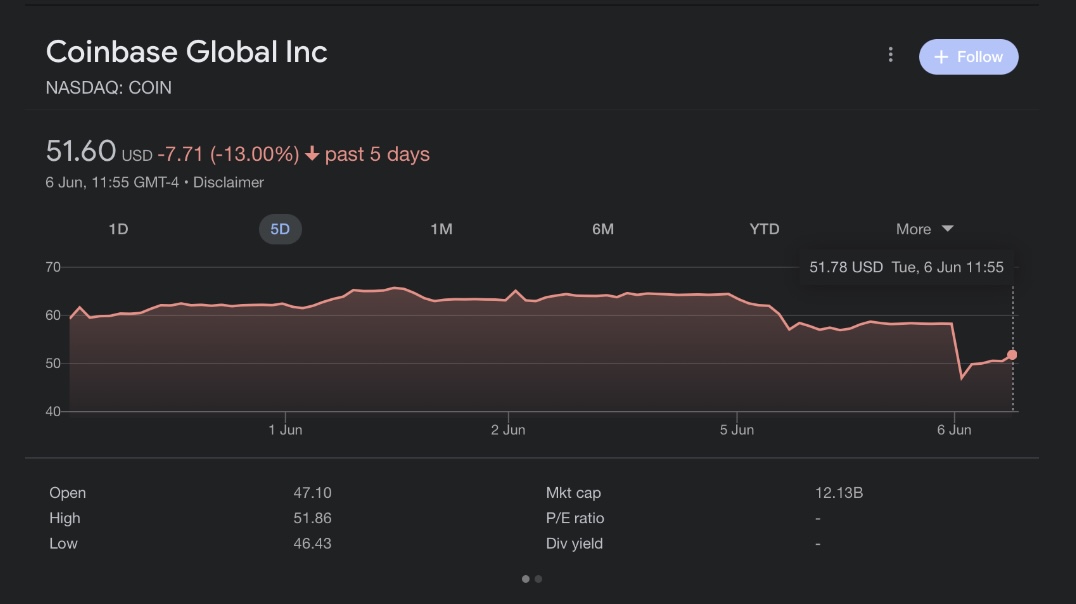The SEC alleges that Coinbase has been operating as an unregistered national securities exchange, broker, and clearing agency, and has also failed to register its crypto asset staking-as-a-service program.

The stock of the renowned cryptocurrency exchange, Coinbase, experienced a significant plummet of over 20% at market open on June 6. This sudden decline sent shockwaves throughout the financial industry and left investors and market analysts grappling to understand the implications.
Coinbase’s shares have managed to recover slightly, currently trading at $51.60, which is a modest improvement from the intra-day low of $46.43 at the time of this writing, However, the company’s market capitalization has taken a substantial hit, now standing at $12.13 billion.

Coinbase’s unfortunate predicament is compounded by the fact that, on the very same day, the U.S. Securities and Exchange Commission (SEC) made a shocking announcement by filing a lawsuit against the cryptocurrency exchange.
The lawsuit alleges that Coinbase has been operating as an unregistered national securities exchange, broker, and clearing agency, thereby violating the regulatory protocols and guidelines set forth by the SEC. Furthermore, the SEC also accuses Coinbase of failing to register its crypto asset staking-as-a-service program, which is a significant breach of compliance.
SEC Chair Gary Gensler, in response to the allegations against Coinbase, expressed his concerns and disappointment, stating, “Coinbase’s alleged failures deprive investors of critical protections, including rulebooks that prevent fraud and manipulation, proper disclosure, safeguards against conflicts of interest, and routine inspection by the SEC.”
Coinbase’s lawsuit by the SEC followed closely on the heels of the securities regulator’s legal action against Binance. The latter was accused of multiple securities law breaches and mishandling customers’ funds, with charges totaling 13 counts. However, the allegations against Coinbase have raised confusion within the cryptocurrency industry, particularly due to its status as a publicly traded company.

Adding to Coinbase’s mounting troubles, a task force consisting of ten state security regulators from Alabama, California, Illinois, Kentucky, Maryland, New Jersey, South Caroline, Vermont, Washington, and Wisconsin issued a Show Cause Order against the exchange.
This order accuses Coinbase of violating securities laws by offering its staking rewards program accounts to Alabama residents without the necessary registration to offer or sell these securities. The seriousness of this accusation is evident as Coinbase now faces the daunting task of responding within 28 days, providing a compelling argument to defend itself and avoid being directed to cease and desist from selling unregistered securities in Alabama.
It is worth noting that Coinbase made its highly anticipated debut on the U.S. NASDAQ exchange on April 14, 2021, amidst much fanfare and investor enthusiasm. However, the current state of affairs has taken a toll on the company’s stock performance. In fact, Coinbase shares have now plummeted a staggering 88% from their all-time high of approximately $435, achieved on the very day of their listing.